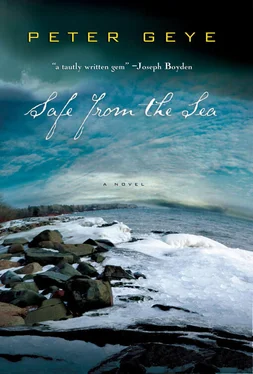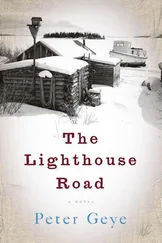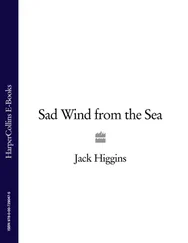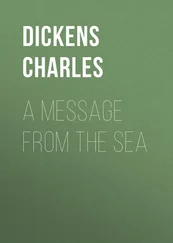Olaf looked up at the ceiling. “I don’t remember being scared, no. But I sure wasn’t excited about what we had to do.”
“Why didn’t you use the tunnels?” Noah asked.
“The Rag didn’t have a tunnel.”
“But you could have just walked on top of the ballast tank.”
Olaf smiled. “I forget how well you knew those boats. The Rag ’s ballast tanks didn’t have square tops. They were slanted to meet the bulkhead without any straight angles.
“The object of the design,” Olaf said, “was twofold. First, it was made to make cleaning the cargo hold easier. Without a straight ledge to sweep, we would save a half hour’s labor every time we changed cargos. That adds up over a season. It was also an engineering concept that allowed more of the ballast-tank water — when the ballast tanks were full — to sit lower in the bulkhead, creating a lower center of gravity with less water. This way it would take less time to pump the water out. The idea was a flash in the pan, and no other boats I ever knew were built the same way.
“It wouldn’t have mattered anyway. We got across the deck fine. It’s what we found when we got there that was the problem.
“I stopped in my berth and changed into some dry clothes before I gathered the men to come with me. I stripped out of my damp pants and socks and shirt and put on my union suit and dry pants, fresh socks and a turtleneck. I grabbed my pea jacket, my mittens, and hat, and when I was all bundled up I topped myself off with the raincoat and the orange life preserver that had sat for years in the wooden basket above my desk.
“For some stupid reason I checked the four porthole windows in my cabin,” he said. There was surprise in his voice, like it was a memory that had only come back to him then, all those years later. “I wonder why I did that.
“Whatever the reason, it gave me the minute I needed to remember my watch. Your mother had given it to me the Christmas before. It was on a sterling chain in my desk. I kept it there for safety.
“When she gave it to me she told me it’d bring me luck. I decided I wanted to have it with me when I died. In fact,” Olaf said as he dug into his pocket, “here it is.” He handed it to Noah.
It was beautiful, a tarnished nickel-silver pocket watch with an analemma on its face. The movement was visible behind a rear crystal, and when Noah flipped it open he saw the name of the watch company engraved on the bezel. UTVIKLING URMAKER — KRISTIANIA 1920.
“I’ve never seen this before,” Noah said.
Olaf was settling stiffly back into the chair. “It needs to be polished,” he said.
“So you put the watch in your pocket?” Noah asked.
“I did.”
“And then you went to get the other guys?” he said, handing it back.
Olaf began fingering the clasp with one hand as he tried to remove some of the patina. “It’s a damn strange thing, isn’t it?” he asked. “This flimsy little watch, this soft metal chain.” He looked up at Noah. “And that big old boat. Steel made from the ore of her predecessors, steel they’d made army tanks from. Almost a million rivets, two football fields long, eight thousand tons. One of them made it and the other one didn’t.”
Olaf worked the patina on the watch with his fingers, his jaw quivering in a now familiar way. The look of concentration on his face had given way to drowsiness.
“How did you pick the guys to cross the deck with you?”
“I picked Red because he was the single strongest guy I ever knew,” Olaf said. “Short bastard, built like a brick shithouse, with a red beard that hung to his chest and eyebrows the same color, bushy as a hedge. He had a cannonball of a gut, rock solid and sticking out there like a pregnant woman’s. Huge shoulders”—he hunched his shoulders up for effect—“but the smallest goddamn feet you ever saw. Like a bird.
“And a goofball, too. Always laughing and joking and playing pranks, good guy to have on your boat any time of year but especially in the fall, when everyone’s good and goddamn tired of each other. He wore the damnedest red boots.
“During a lifesaving drill earlier that year, he hauled one of the lifeboats twenty yards up a Lake Ontario beach. Might not sound like much, but I could have picked any team of three other guys on that boat and together we wouldn’t have been able to do the same thing. Amazing. I’m sure I had that in mind when I told him to bundle up.”
“Why Luke?”
“Luke was the guy I trusted most on that boat. He was the only guy — aside from Jan — who I believed would do anything to save another guy’s life. You said something about heroes, well, Luke was as close as we got.
“He was in his cabin, and I poked my head in and said, ‘Luke, we’re going aft. We’ve got trouble,’ and he was up and in his gear in thirty seconds. Keep in mind he was asleep in his drawers at the time. Always willing to help, always had the best interest of the crew in mind.” Olaf yawned, twitched his nose, and tried to cross his legs but couldn’t.
“And why Bjorn?”
“Bjorn was sitting closest to the door.”
Again the photograph in the maritime museum of the three men huddled on the beach came to mind. The distance between Bjorn’s place at the card table and that otherworldly beach suddenly seemed like an impossible span. Noah wondered how much the picking of that particular group of men mattered. He wondered if Red had been a weakling, or if Luke had been less willing, or if Bjorn had been asleep in his bunk, whether things would have turned out differently.
Olaf interrupted Noah’s thought. “We were out on the deck within minutes. I instructed the boys to keep together and latched myself onto the lifeline. I went first, then Red, then Bjorn, and Luke was last. The lifeline was a taut, half-inch steel cable that ran from the bow decking to the stern decking right down the middle of the boat. We had lines attached to our waists that we clipped onto it.
“We each had a flashlight or headlamp. Red had a walkie-talkie. There were half-a-dozen lamps running down the edge of either side of the deck. On a clear night they lit the Rag up like a boulevard, but they barely cracked the darkness that night. And the spotlight Jan had shining down on us from the roof of the pilothouse was just a little glimmer in the dark. Might as well have been a star on a cloudy night for all the good it was doing.
“The darkness wasn’t the terrible part, though. It was everything else. Even though we’d gotten the ship turned around, we were still taking some pretty heavy seas, and our big problem was the ice. The deck was covered with it, the lifeline was heavy with it, and in no time at all we were covered in it ourselves. And the wind — Jesus Christ, the wind — so strong at times it’d just whip up behind us and send one of us sprawling face-first onto the deck.
“And the snow,” he said finally and whistled.
“And cold?”
“So goddamn cold I felt like I was on fire,” Olaf said.
One of the few points of difference in the chronicles of that night was the moment at which the fire became the central fact of the catastrophe. Although Bjorn had told a reporter during an interview a few weeks after the wreck that they could smell the fire while they were crossing the deck — a detail that should have put the speculation to rest — some refused to believe this could have been true. They argued that it would have been impossible to smell the fire, seeing how the smoke would have been contained in the engine room, how by then the wind would have been coming from behind them. These same people argued that any fire would certainly have resulted in an immediate explosion that the men on the deck would have heard and felt despite the rough crossing. Noah doubted these speculations. Although it seemed fair enough to assume that they might have felt or heard the explosion, it didn’t seem out of the realm of possibility that they might not have, either. As for smelling the fire, Noah had little doubt that the stench could have escaped from any of a hundred crannies in the decking.
Читать дальше












